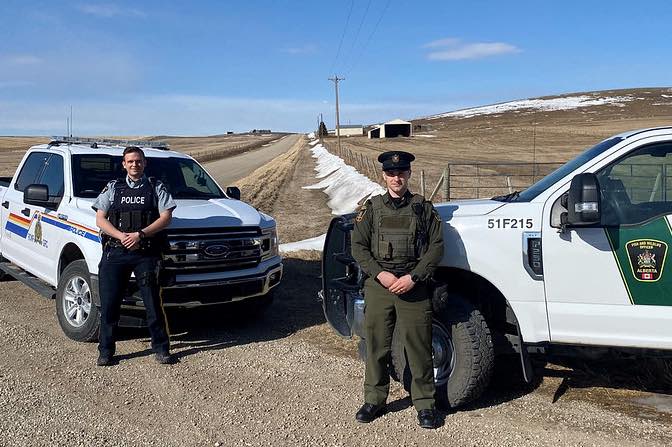Alberta
Alberta RCMP issue more than 2,000 tickets as part of #OperationImpact2023 safety campaign.

This Thanksgiving weekend, the Alberta RCMP along, with police forces across the country, participated in an annual initiative organized by the Canadian Association of Chiefs of Police focused on encouraging safety on Canadian Roads, #OperationImpact2023.
While patrolling Alberta’s provincial roads this Thanksgiving, Alberta RCMP issued more than 2,000 tickets.
Overall, 55 tickets were issued for distracted driving, 40 tickets were issued for seatbelt infractions, 15 tickets were issued for liquor offences, and 902 tickets were issued for speeding. Of the tickets issued for speeding, 12 of them were in excess of 50 km/h with one ticket being issued for a driver traveling 185 km/h. Immediate roadside sanctions were issued to 86 drivers who were found to be under the influence of drugs or alcohol resulting in driving suspensions and vehicle seizures.
To ensure that Albertans were complying with traffic safety rules, Evansburg RCMP partnered with Alberta Fish and Wildlife, Parkland County, and Alberta RCMP Traffic to conduct a check stop on October 6.
The Evansburg check stop checked approximately 700 vehicles over the course of the weekend. While only one motorist was found to be driving impaired, Evansburg RCMP did find drivers in possession of illegal drugs, illegal cigarettes, and several motorists driving without proper insurance or vehicle registration.
The Alberta RCMP would like to remind drivers that traffic safety is everyone’s responsibility and thank all those who helped keep themselves and others safe by following the rules of the road this Thanksgiving.
For more traffic safety information, please follow us on Facebook @RCMPinAlberta and Twitter @RCMPAlberta.
Alberta
Premier Danielle Smith responds to election of Liberal government

Premier Danielle Smith released the following statement following the re-election of a Liberal government in Ottawa.
I congratulate Prime Minister Mark Carney on his minority government election victory last night.
I also want to sincerely thank Pierre Poilievre for his powerful and principled advocacy against the last decade’s punitive taxation and anti-resource policies that have made our country weaker, more divided and overly-dependent on the United States.
Mr. Poilievre’s vision for a safer, more affordable, united and prosperous Canada drove the policy debate in this country for the last several years and has inspired millions to see the unique potential of our nation. While Liberals and New Democrats demeaned and demonized Albertans, our values and our industries for political gain, Mr. Poilievre made empowering Albertans and our energy sector a cornerstone of his campaign. His respect and admiration for Albertans could not have been clearer. He is and continues to be a true friend of Alberta.
As Premier, I invite the Prime Minister to immediately commence working with our government to reset the relationship between Ottawa and Alberta with meaningful action rather than hollow rhetoric. A large majority of Albertans are deeply frustrated that the same government that overtly attacked our provincial economy almost unabated for the past 10 years has been returned to government.
As Premier, I will not permit the status quo to continue. Albertans are proud Canadians that want this nation to be strong, prosperous, and united, but we will no longer tolerate having our industries threatened and our resources landlocked by Ottawa.
In the weeks and months ahead, Albertans will have an opportunity to discuss our province’s future, assess various options for strengthening and protecting our province against future hostile acts from Ottawa, and to ultimately choose a path forward.
As Premier, I will facilitate and lead this discussion and process with the sincere hope of securing a prosperous future for our province within a united Canada that respects our province’s constitutional rights, facilitates rather than blocks the development and export of our abundant resources, and treats us as a valued and respected partner within confederation.
Our government will be holding a special caucus meeting this Friday to discuss this matter further. I will have more to say after that meeting is concluded.
Alberta
Low oil prices could have big consequences for Alberta’s finances

From the Fraser Institute
By Tegan Hill
Amid the tariff war, the price of West Texas Intermediate oil—a common benchmark—recently dropped below US$60 per barrel. Given every $1 drop in oil prices is an estimated $750 million hit to provincial revenues, if oil prices remain low for long, there could be big implications for Alberta’s budget.
The Smith government already projects a $5.2 billion budget deficit in 2025/26 with continued deficits over the following two years. This year’s deficit is based on oil prices averaging US$68.00 per barrel. While the budget does include a $4 billion “contingency” for unforeseen events, given the economic and fiscal impact of Trump’s tariffs, it could quickly be eaten up.
Budget deficits come with costs for Albertans, who will already pay a projected $600 each in provincial government debt interest in 2025/26. That’s money that could have gone towards health care and education, or even tax relief.
Unfortunately, this is all part of the resource revenue rollercoaster that’s are all too familiar to Albertans.
Resource revenue (including oil and gas royalties) is inherently volatile. In the last 10 years alone, it has been as high as $25.2 billion in 2022/23 and as low as $2.8 billion in 2015/16. The provincial government typically enjoys budget surpluses—and increases government spending—when oil prices and resource revenue is relatively high, but is thrown into deficits when resource revenues inevitably fall.
Fortunately, the Smith government can mitigate this volatility.
The key is limiting the level of resource revenue included in the budget to a set stable amount. Any resource revenue above that stable amount is automatically saved in a rainy-day fund to be withdrawn to maintain that stable amount in the budget during years of relatively low resource revenue. The logic is simple: save during the good times so you can weather the storm during bad times.
Indeed, if the Smith government had created a rainy-day account in 2023, for example, it could have already built up a sizeable fund to help stabilize the budget when resource revenue declines. While the Smith government has deposited some money in the Heritage Fund in recent years, it has not created a dedicated rainy-day account or introduced a similar mechanism to help stabilize provincial finances.
Limiting the amount of resource revenue in the budget, particularly during times of relatively high resource revenue, also tempers demand for higher spending, which is only fiscally sustainable with permanently high resource revenues. In other words, if the government creates a rainy-day account, spending would become more closely align with stable ongoing levels of revenue.
And it’s not too late. To end the boom-bust cycle and finally help stabilize provincial finances, the Smith government should create a rainy-day account.
-

 2025 Federal Election2 days ago
2025 Federal Election2 days agoMark Carney: Our Number-One Alberta Separatist
-

 2025 Federal Election2 days ago
2025 Federal Election2 days agoCanada is squandering the greatest oil opportunity on Earth
-

 International1 day ago
International1 day agoU.S. Army names new long-range hypersonic weapon ‘Dark Eagle’
-

 Autism1 day ago
Autism1 day agoUK plans to test children with gender confusion for autism
-

 COVID-191 day ago
COVID-191 day agoFormer Australian state premier accused of lying about justification for COVID lockdowns
-

 Alberta3 hours ago
Alberta3 hours agoPremier Danielle Smith responds to election of Liberal government
-

 Business1 day ago
Business1 day agoNet Zero by 2050: There is no realistic path to affordable and reliable electricity
-

 Addictions1 day ago
Addictions1 day agoFour new studies show link between heavy cannabis use, serious health risks


